Project Overview
I developed a series of in-depth course reviews for e-learning platforms Masterclass and Mindvalley. I worked with Ideapod and Hackspirit founder, Lachlan and Brendan Brown, in outperforming existing reviews and becoming the go-to resource for individual Masterclass and Mindvalley courses.
The Brown brothers own Ideapod (2M monthly visits), Hackspirit (13M monthly visits), and Lovepanky (9M monthly visits) - which are the biggest “practical philosophy” and relationship websites.
Content Goal
- Create the best course review content on individual courses by filling in the gaps in the existing top reviews and highlighting the values and benefits of a Masterclass or Mindvalley subscription
- Identifying friction points different buyers encounter, and creating key messages that are hyper specific to address each reader persona’s reservations
Output and Deliverables
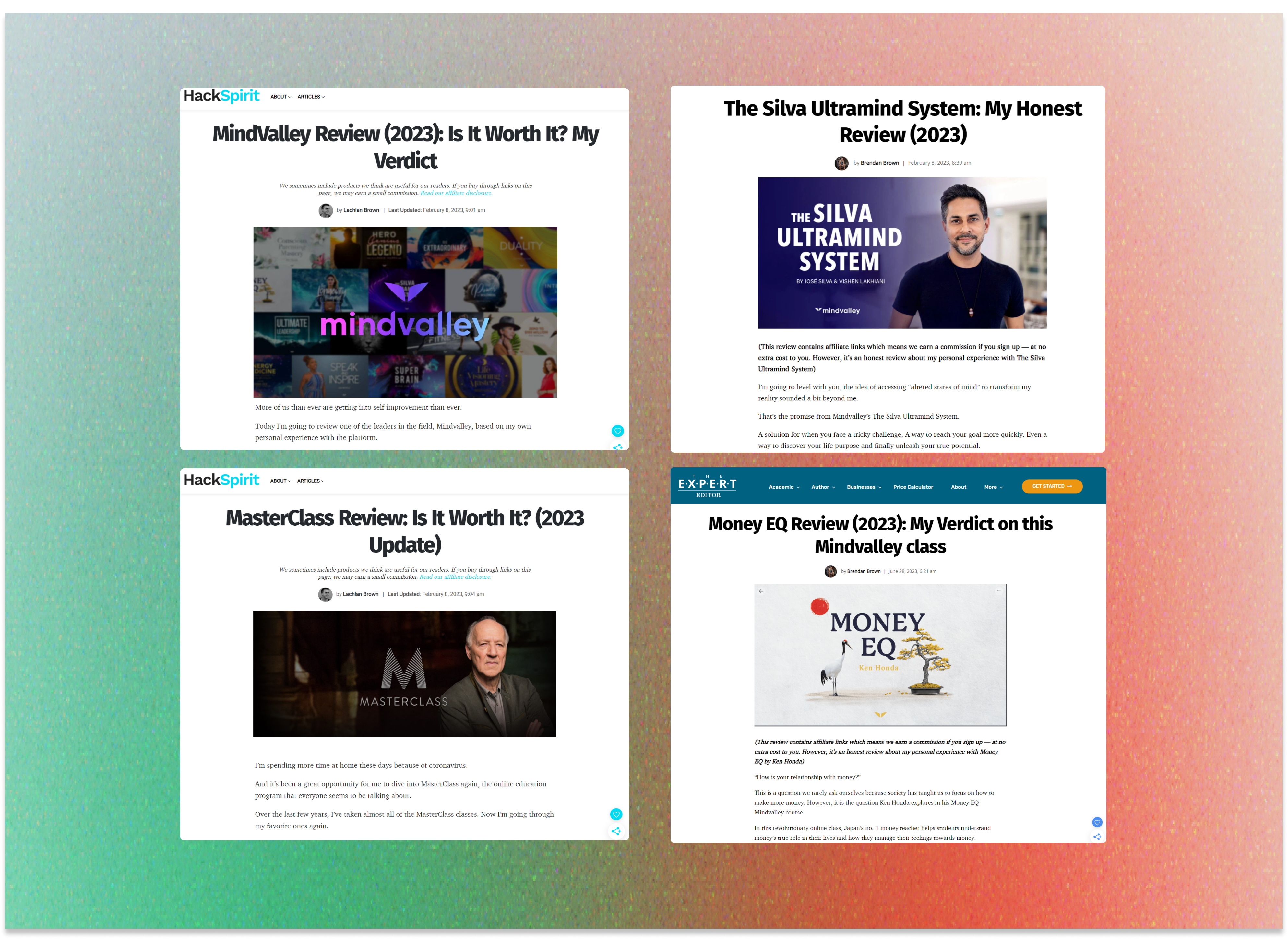
I worked with Masterclass and Mindvalley affiliate partners in creating the following articles:
Mindvalley
- Jim Kwik’s Superbrain Review
- The Silva Ultramind by Mindvalley: It It Worth It?
- Lisa Nichols Speak & Inspire Review: Is it Worth It?
- Dr. Michael Beckwith Life Visioning Mastery review (2023): Is it worth it?
- Mindvalley’s Unlocking Transcendence: An honest review
- Money EQ Review (2023): My Verdict on this Mindvalley class
- Energy Medicine Quest review: Is it worth it? My verdict
- Mindvalley Review (2023): Is the Mindvalley Membership Worth It?
- MindValley Review (2023): Is It Worth It? My Verdict
- Conscious uncoupling Mindvalley review: Is it worth it? My verdict
Masterclass
Note: Some of the Masterclass and Mindvalley course reviews we published are no longer available online at the time of writing because:
- The partner is no longer part of the affiliate partnership with Masterclass
- The course is no longer available on the platform
This project went from 2019-2022. Titles that refer to a 2023 date are the original content I worked on, updated to reflect new content available in the courses.
Content tone
These resources are:
Nuanced and relatable
Review articles have to toe the balance of being knowledgeable enough that you’re a credible source, and relatable enough that the readers see your “learning something” as a testament to the course’s value and quality.
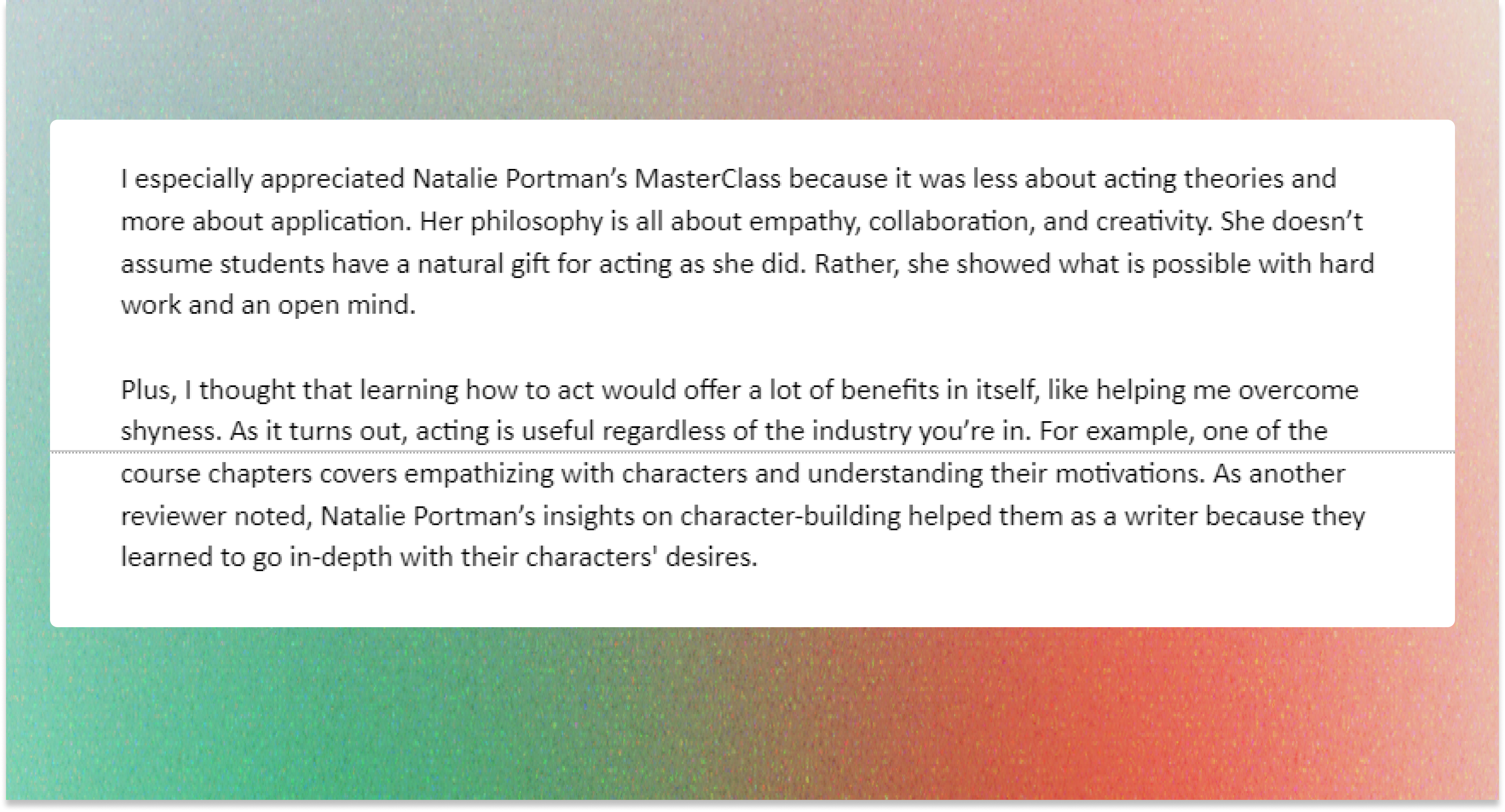
Concrete and actionable
Good content gives readers something to “bite on”. Using very specific examples and mentioning beliefs and judgments that users may have makes them feel understood -- which makes them think this content is 100% for them.
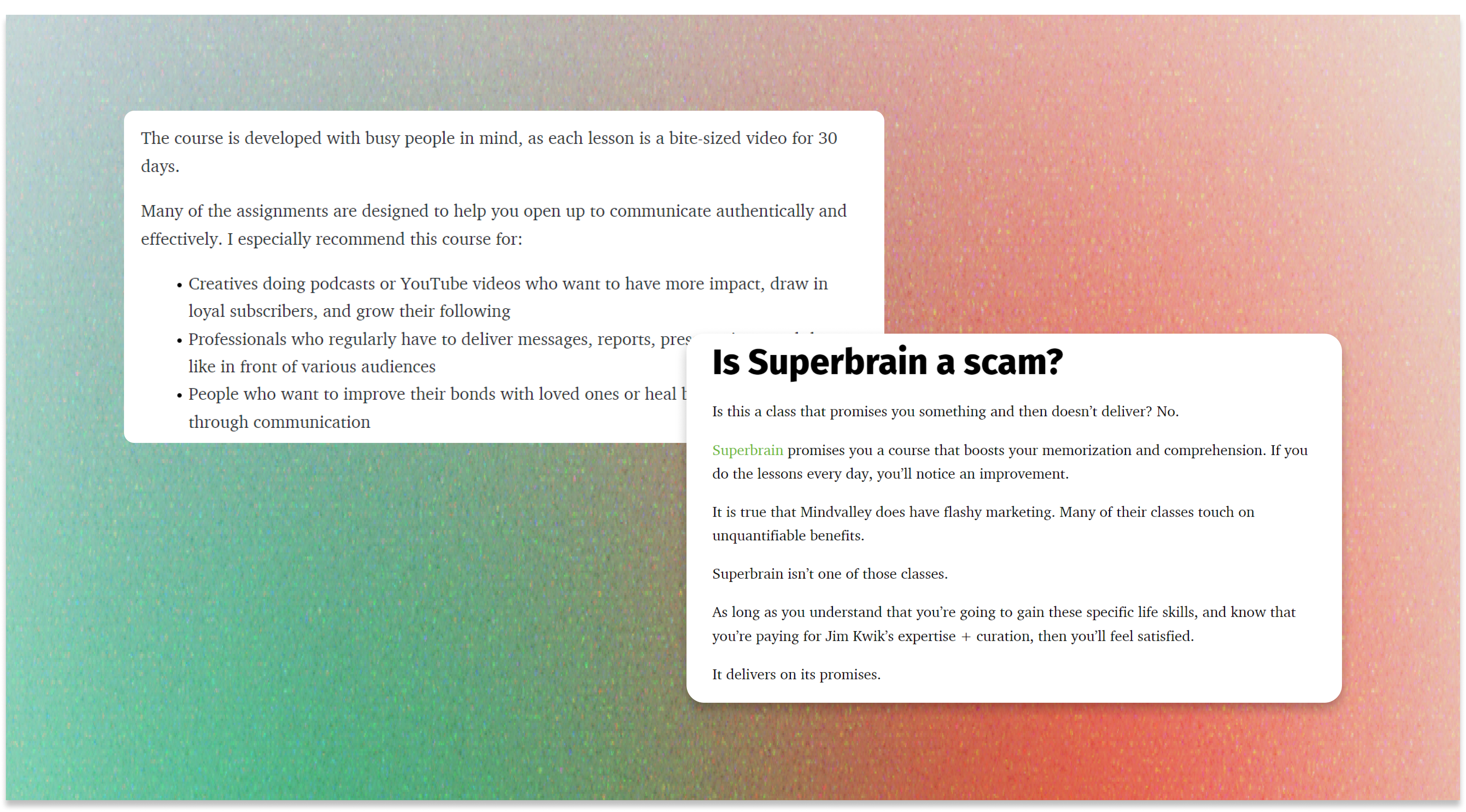
Aspirational and virtue-driven
E-learning platforms like Masterclass brand themselves on self-development and improvement. In keeping with the brand values, I try to hint at realistic opportunities for self-development in the content and address how they may participate even if they feel discouraged.
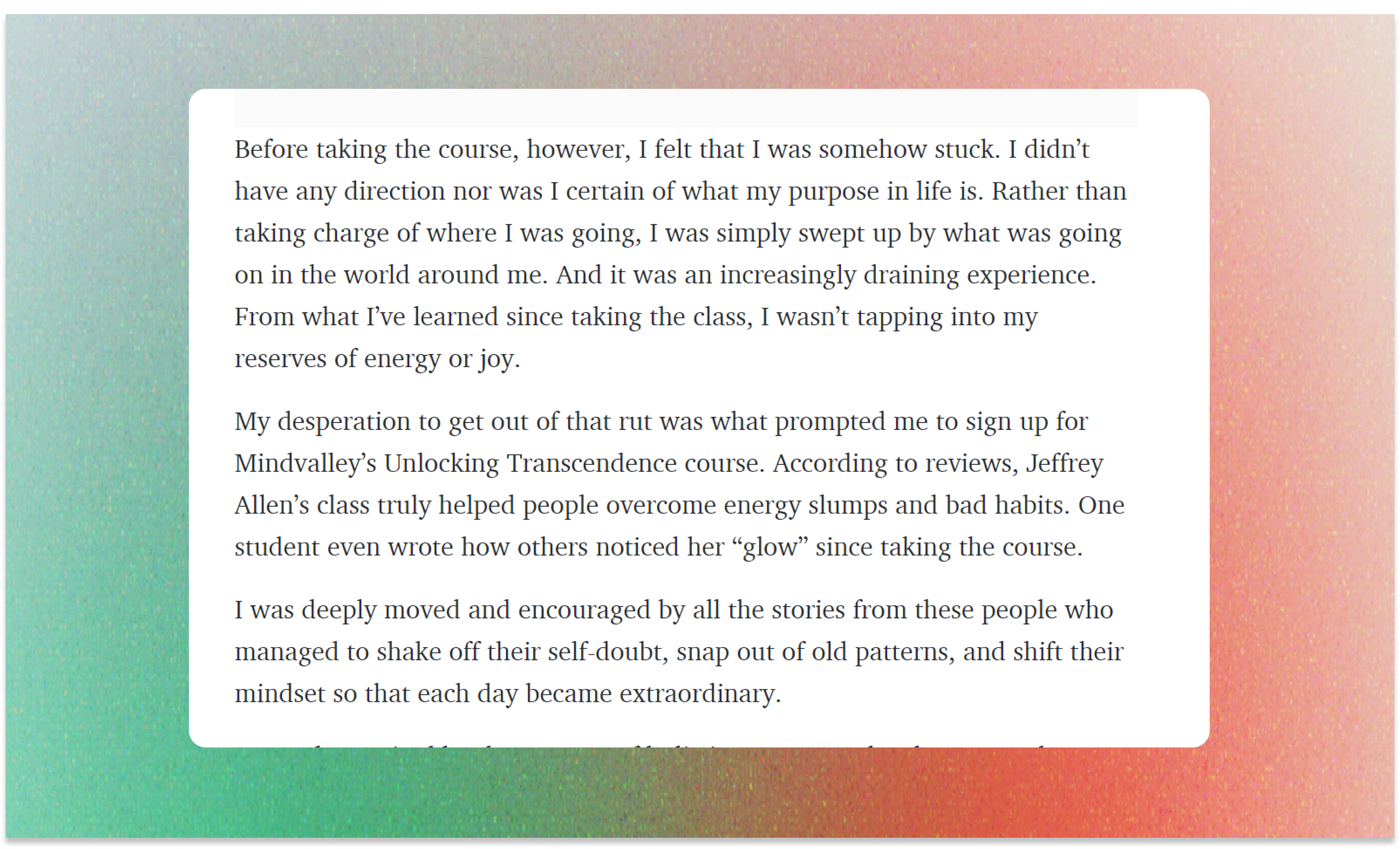
Key Objectives
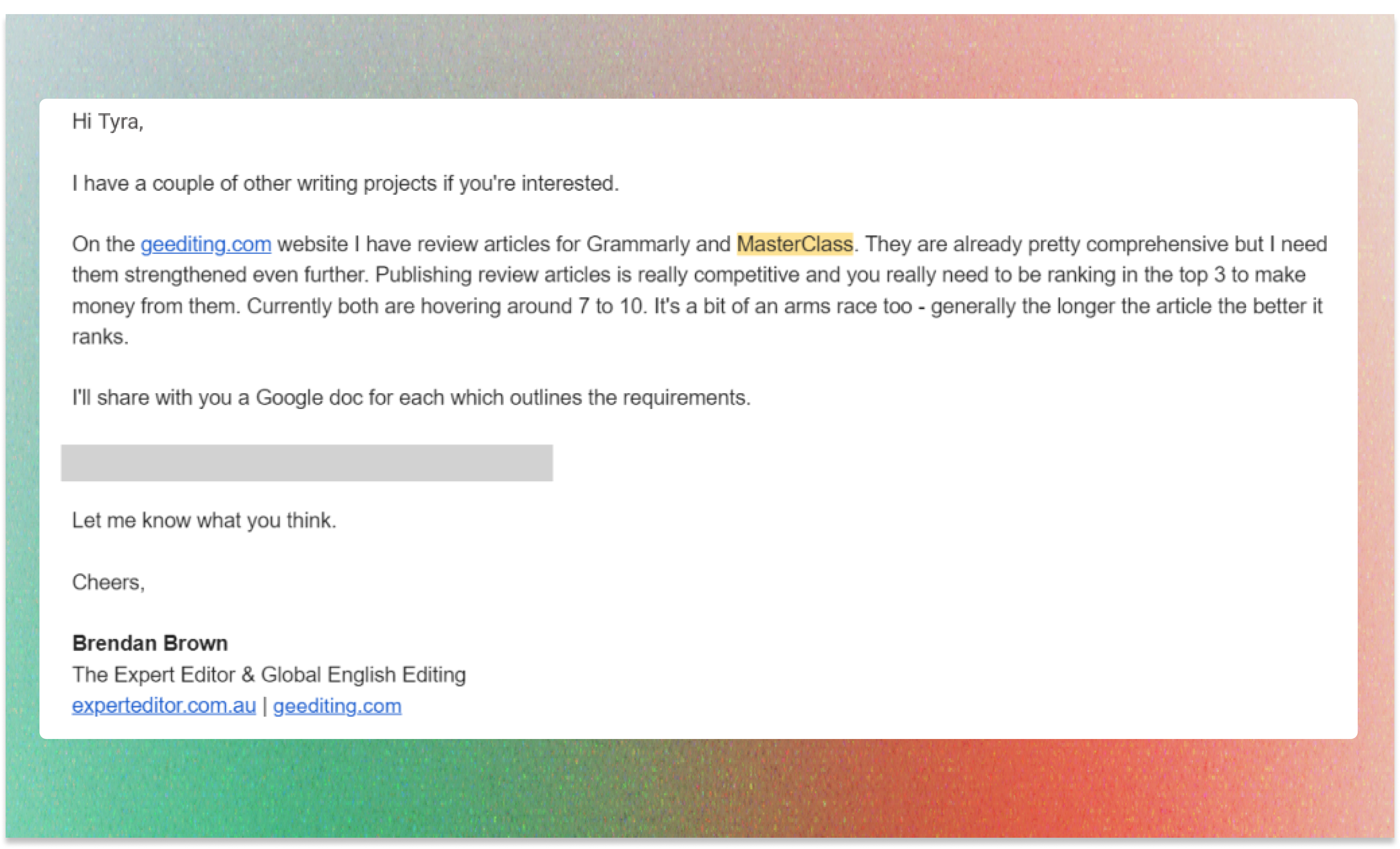
I started this project by editing an already-existing article where I fleshed out the headers according to my approach.
We collaborated on more articles, with me writing from scratch, following that same approach and positioning.
Tasks Performed
- Audit the existing top course reviews and create more well-rounded content by aggregating key information found in different reviews and filling in the gaps that other articles don’t include
- Identify key information buyers need in order to convert and develop a UX-friendly structure/format for easy skimmability
- Develop a buyer persona for each topic or class and understand that persona’s objections, beliefs, and interests
- Develop highly specific articles that answer the questions: “why should I buy this”, “why is this important to me”, “why should I trust this review over others”, “is X platform worth it?”
Challenges
How do we write in-depth reviews for hyper specific audiences, when we are not a part of that community?
I’m using the deadmau5 Masterclass as an example, but this approach applies to all course reviews.
Understand how the community finds information
Some communities are happy looking at aggregated lists from media outlets; most would prefer peer reviews from verified sources such as LinkedIn, or at the very least, open forums such as Reddit.
In writing the deadmau5 MasterClass Review, I learned that there was a dedicated subreddit for edm production. There are also popular Youtubers specifically on EDM production for beginners.
Starting the research by seeing where the end-user gets their information from, especially if you’re not within that community, helps you understand:
- What is it about these resources they find valuable?
- The depth of knowledge they have; are these usually beginners looking for sweeping, general tips? Are they looking for very specific information? At what point do they start transitioning to the “next phase” of learning?
- What kind of information do they trust?
Learn the community “meta”
Opinions differ but there are commonly repeated themes.
The goal isn’t to pick a side and speak from that position in the course reviews; the goal is to identify the stories and “common knowledge” circulated within the group.
What are their inside jokes? What’s accepted as “common knowledge?” Is deadmau5 considered a good producer? Why or why not?
Learning the meta ensures that you’re writing the content from their POV, not an outsider’s.
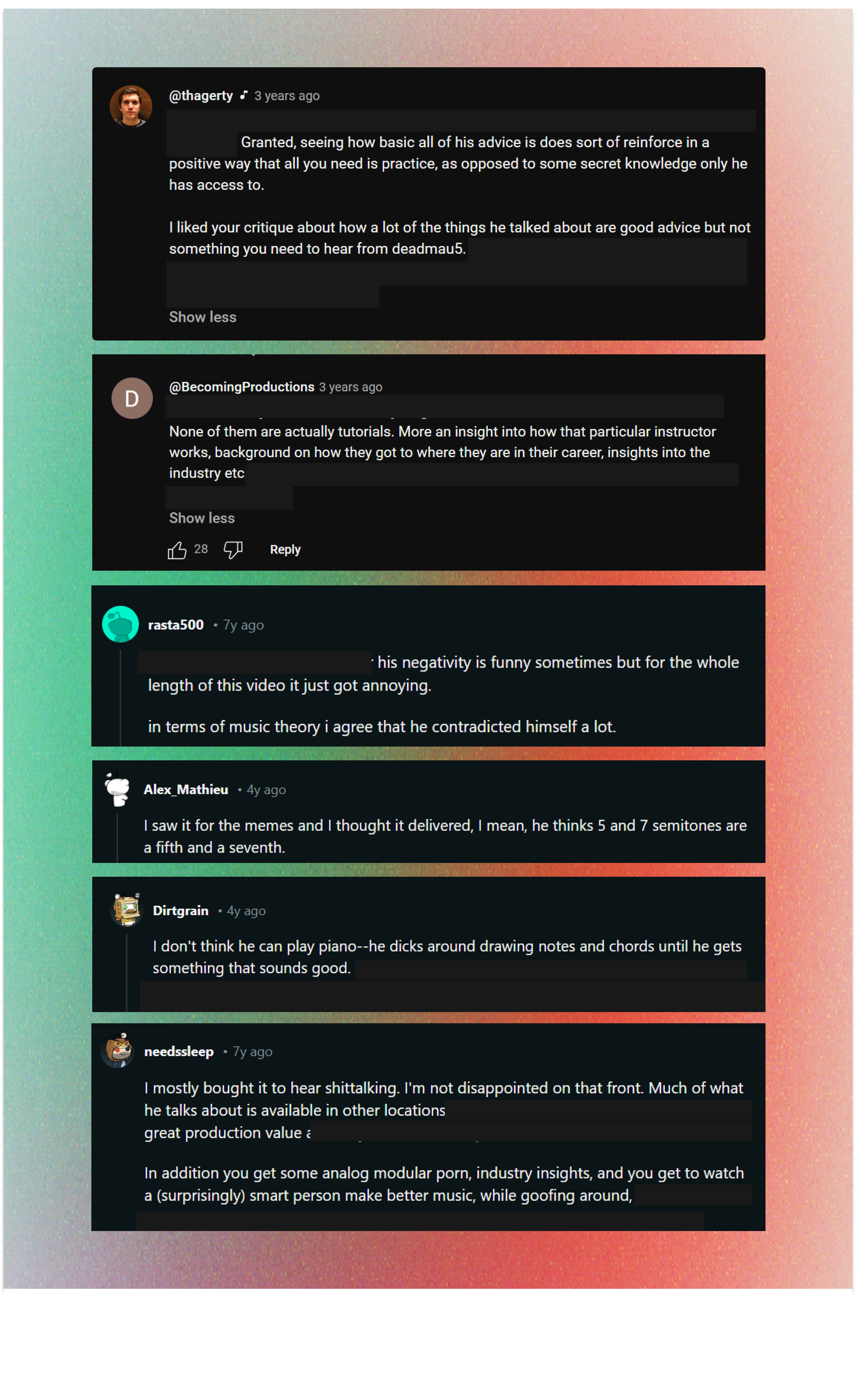
What’s the meta?
- Deadmau5 isn’t the best resource for music theory but has a good ear
- Deadmau5 doesn’t have a process - he mostly plays around with equipment until something sounds good
- He’s known for having an “interesting” personality
- Trusting yourself goes a long way - making great music is about “thinking of the big picture”
- Mastering music production is a process - you can master it by sinking time into it
What concerns does the community typically have?
- “Do I have what it takes to make music - what I’m not naturally talented?”
- “Can I still make good music on a budget?”
- “How do I get access to secret tips to make my music better?”
- “What’s the secret behind the top EDM producers doing so well? What’s their secret process?”
How does that translate to content?
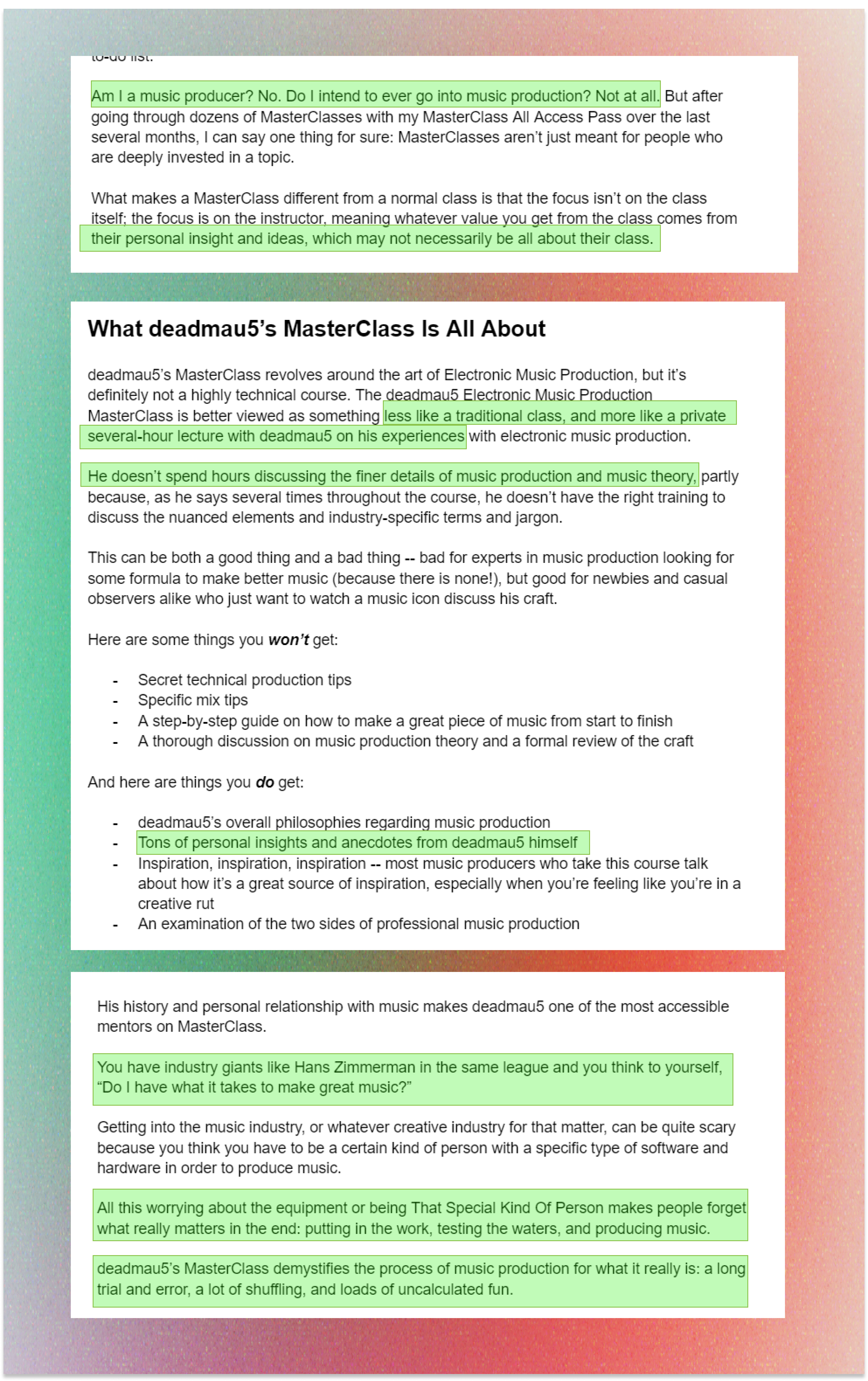
Approach
Good course reviews don’t focus on why the material is great - they focus on how it can make the buyer great.
“How does it relate to me? How does it make my life better after I purchase the course?”
In course reviews, buyers are looking for the following tangible information:
- What do I get out of this course - what exactly is in the course plan?
- How much is it and is it worth it?
- Who would best benefit from this course? Who wouldn’t?
- Why is the course instructor reliable?
- Why is this particular course review reliable?
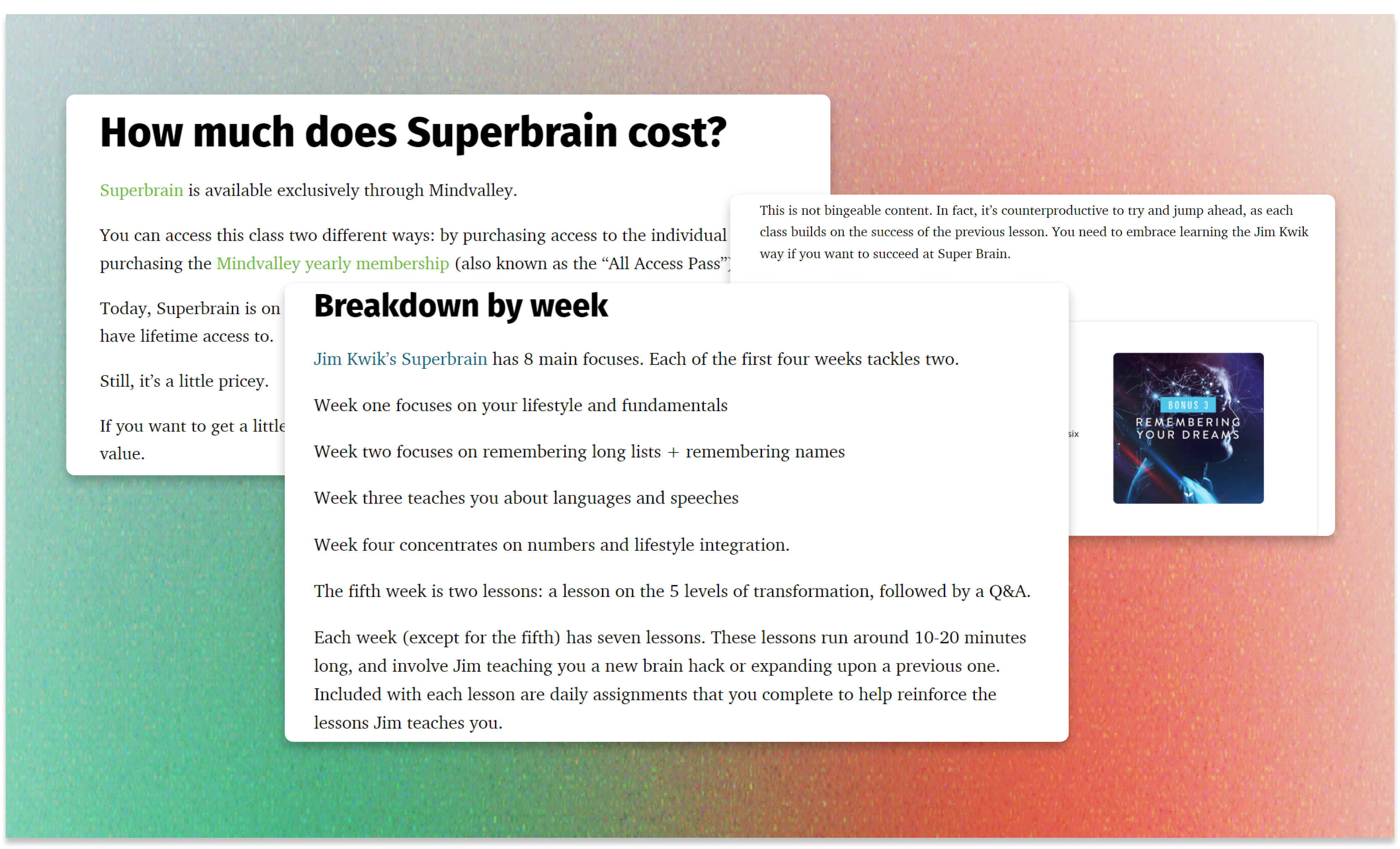
But what about their intangible reservations?
Is a clear $90 price tag enough to determine a course’s worth?
In answering the more intangible aspects, I addressed the following:
- Is the course reviewer in the same stage as me? Are they a beginner? Is that why they find this valuable? Can I relate from the value they are getting out of this?
- What can I get from this course that I can’t get from other platforms like books, podcasts?
- How can I relate to the course instructor? Did they solve the same problems I have now?
- What beliefs of mine are being represented here? How can I know that this content is 100% for me?
Buyers convert when they are confident their concerns are well-represented.
Providing concrete information such as pricing, lesson plan, and information about the course, as well as positioning the content to come from their POV is the key to great reviews.
Masterclass and Mindvalley are lifestyle courses, hence the approach.
I would focus more on the methodology and the technical aspects of the review if the courses were around more technical topics, or if the target audience were more advanced.
Topic Ideation
The topics were provided by the Brown brothers. I was in-charge of figuring out how to structure the article based on the given title and search intent.
I was in charge of figuring out relevant H2 tags/subtopics to include, and how to flesh out the rest of the article.
Content outline and structure
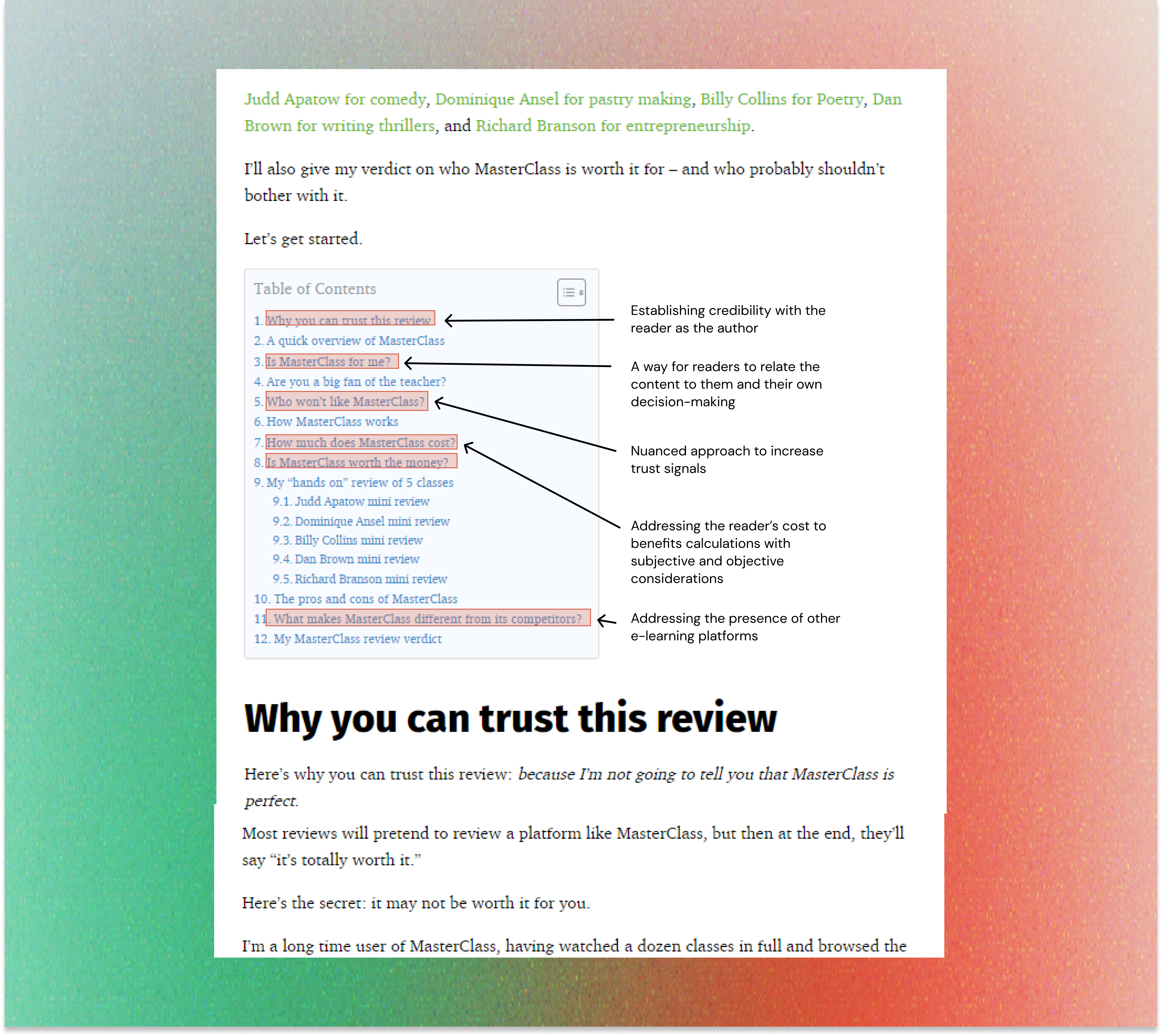
The articles typically followed the format above, with the goal of meeting the reader’s objections, beliefs, and considerations.
Addressing their concerns and speaking to their reservations or problems directly are great ways to instill trust, and encourage users to make a purchase.
Results and impact
Affiliate conversion (how many subscriptions Masterclass and Mindvalley got, routed specifically from the course reviews) is a great way to measure if the content actually performs and brings in revenue. Unfortunately that’s not a metric I had access to.
What is publicly available would be the backlinks and domain rating of the individual pages. I have here 6 articles from bigger sites like Ideapod and Hackspirit, and smaller sites like Nomadrs and Expert Editor.
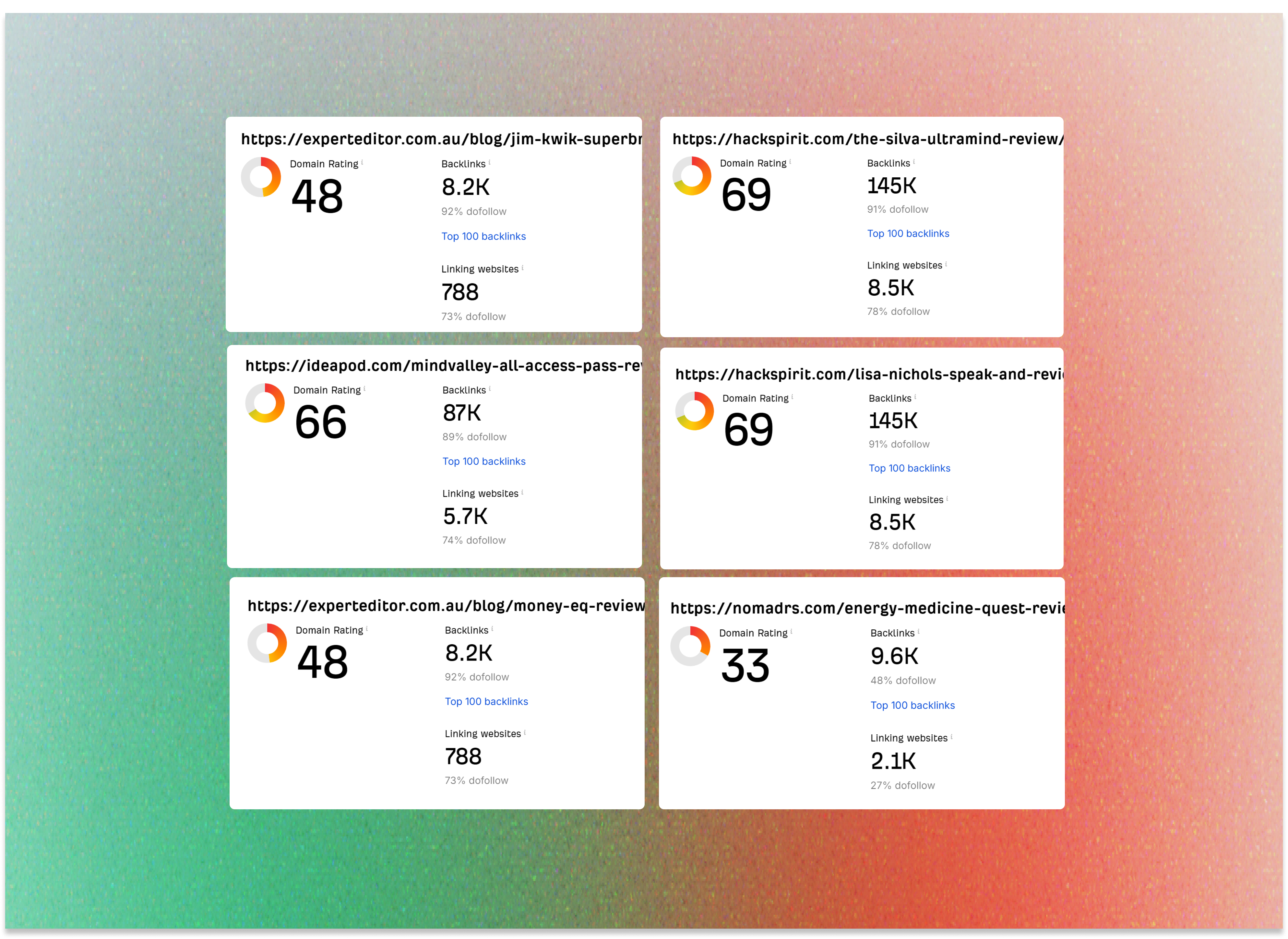
Backlinks indicate that other websites see your content as a reputable resource, linking back to your original article.
I think stand-alone metrics like these don’t really mean anything, no matter how successful, if they don’t contribute directly to revenue. Unfortunately I don’t have a way to reflect on that because I don’t have access to that metric, so I will speak of what this means in terms of brand awareness and website health in general.
In this context, the sheer volume of backlinks contribute to a higher domain rating. With cumulative articles like this earning the same backlinks, Google associates the site as a reputable, helpful resource in the niche.
It’s good for:
- Associating your brand as a reputable source for a specific niche, industry, or problem
- Building awareness within a community that your website is a great resource for that
- Increasing visibility for very specific keywords/problems
Would this still work in 2024+, with GPT and Tiktok?
That depends on the target audience and their buying behavior.
Masterclass and Mindvalley don’t have dedicated “discovery” groups - their communities are platform-exclusive, meaning users need to have already purchased a subscription before interacting with other buyers and seeing what they thought of the programs.
So where do they go before buying? Reddit and review sites like these.
This approach works when information isn’t democratized. End-users who are looking for in-depth reviews won’t find them on Reddit, so this strategy is a viable option.
This would likely not work for platforms where:
- Users are more “savvy” and doubtful of the authenticity and reliability of online reviews IE marketers, developers, high-level decision makers
- The platform sells very specific skills instead of a lifestyle or an outcome
- The community isn’t controlled by the platform; there is a pre-existing community interested in learning and the platform came after the community
- The information the course sells is very democratized; users do not need access to a very specific instructor to get the same insight